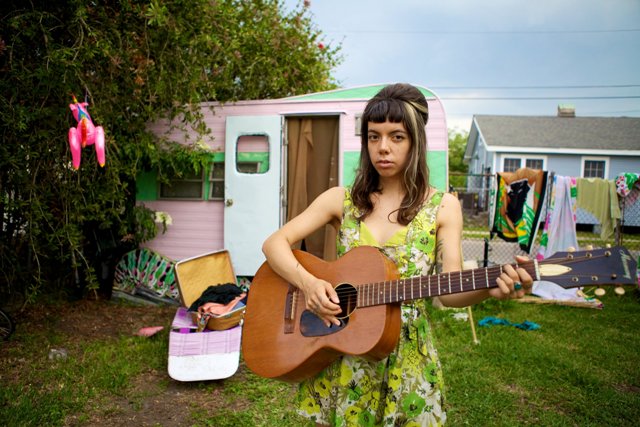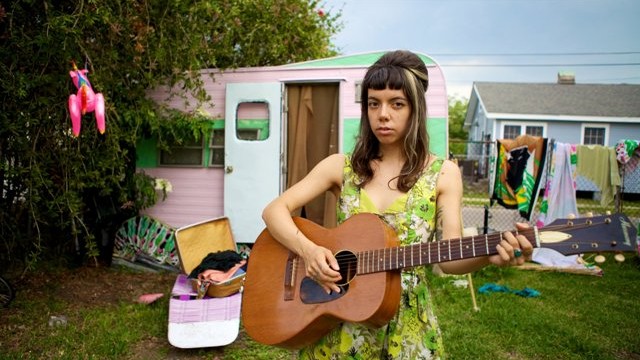By Jim Morrison
“I don’t want Google Glass or anything, but I feel like so much of what I believe in is very modern,” Hurray for the Riff Raff’s Alynde Lee Segarra says. “When I hang out amongst musicians that are really trying to live like they’re in the past, politically I get very uncomfortable.”
That aptly sums up the appeal of the vehicle for her songwriting, Hurray for the Riff Raff, an act that broke big with its 2014 major label debut, “Small Town Heroes.”
It made dozens of best lists (including mine), earning raves from Rolling Stone, Pitchfork, and NPR, among others. “She has a subtle, expressive voice that she wraps around songs that draw on the sounds and styles of the American South, and her lyrics often take unconventional tack on traditional subjects,” wrote a reviewer for The Wall Street Journal.
While the sound of “Small Town Heroes” pay homage to traditional American music from folk to Appalachian to doo wop, Segarra has a decidedly modern take informed by her love of Ani DiFranco, Bikini Kills, John Prine, the Velvet Underground and others.
Segarra plays the Bayou Boogaloo at Town Point Park on Friday, June 19, so, naturally, New Orleans, where she landed after some Jack and Woody-like time on the road, informs much of the disc. So do her experiences as a woman on the move.
“I always say that I try to bring the Velvet Underground into a John Prine song, that’s my idea of a perfect song,” she told one interviewer. “I really want to tell stories of characters that are coming from a side of life that isn’t really represented in folk music right now. A lot of folk music is so male, white. I decided that I really want to choose my characters and I wanted to really make them come from a similar place as me.”
“Especially with the song “Small Town Heroes,” I really wanted to have a complicated female character, who’s dealing with a lot of demons, who’s trying to navigate through life, who has these other people in her life that care about her that don’t know how to navigate that with her,” she added. “So much of that comes from my experience living on the street, and my family trying to understand what the fuck to do with me — if they should believe in me, if they should be worried about me, and just what brought me there and what brought me here. In so many ways, I just feel so lucky to have survived it all.”
On “Small Town Heroes,” the slinky “Good Times Blues” is pure Easy. They are both road tunes and tunes about her home in New Orleans. Violence in her St. Roch neighborhood is the topic of “St. Roch Blues.” “Blue Ridge Mountain” has the most old-time feel on the disc, a sojourner’s tale that makes a reference to John Henry. “Crash on the Highway” celebrates pulling over and enjoying some wine in Germany while wishing she was back home at BJ’s Bar. On “End of the Line” she chronicles her love for the neighborhood that became home to her and her songwriter friends.
But the album’s centerpiece and most discussed tune is “The Body Electric,” which turns the traditional murder ballad sideways and shakes hard. She makes reference to the Delia of the song made famous by Johnny Cash, but this is a modern take on violence against women.
She sings:
Said you’re gonna shoot me down, put my body in the river
Shoot me down, put my body in the river
While the whole world sings, sing it like a song
The whole world sings like there’s nothing going wrong
“That song was coming from a place of frustration. I’m kind of a news junkie, and I was reading a lot of stuff in the news about, specifically, girls in high schools getting sexually attacked by classmates,” she told No Depression. “I read a lot about the woman in New Delhi who was attacked and ended up dying. I was just reading so much about these women and it started to just… I was at a show one night and I heard a guy sing this song that was written in the murder ballad fashion, a new song that he wrote, that was all about killing his girlfriend because she was cheating on him.
I was so frustrated and felt like I couldn’t bare hearing another one of these songs ever again. We really detach from songs about violence against women, especially when they’re written in an old style, we tell ourselves as an audience that they don’t mean it in that way and we shouldn’t take them seriously. That started linking with “He didn’t mean it, he was drunk,” or “he was really mad,” or the kinds of excuses we give to the people who [do that]. I felt like I need to write a song or I’m going to explode. I wrote it, actually, really quickly. I was driving and I had to pull over and record it into my phone really fast. I feel pretty good about it. I feel like, playing it live is sort of my most, it really feels like me when I play it.
But, as she notes talking about the song’s video, it’s about more than violence against women “The thing about folk music is that it’s about the past, and the present, and the future, and that’s what I wanted to make that song about,” she said in another story. “I wanted it to represent all these different types of people who feel this suffocated feeling of being a target for some reason. How does that violence interact with them? How do they escape it and still flourish? …I wanted to show how the death of young black men especially is also a feminist issue in a very obvious way in that it affects motherhood, it affects sisters. I wanted to make this more broad statement of how this affects everyone.”
Segarra grew up in the Bronx with her Puerto Rican family, but often vanished to the East Village to hang out with punks.
“When I was a kid I was really in a time warp,” she told The Wall Street Journal. “I would get made fun of because I was really obsessed with the ’50s. I really loved Judy Garland and I loved musicals. I was really into `Wizard of Oz’ and `Singing In the Rain` and `West Side Story.'”
At 14, she took a left turn. “I got really into Marilyn Manson. I just figured out that kids won’t make fun of me if I’m just weird and scary. I remember my aunt—`What is going on! When did this happen!?'”
She found the disconnect with nature in the city suffocating so she hit the road. At 17, she ran away, hopping trains across the country, consorting with a changing band of traveling youths. By 19, she’d landed in New Orleans. She learned the banjo and joined bands. Inspired by songwriters like Townes Van Zandt and Gillian Welch, and singers like John Lennon and Billie Holiday. She busked on the streets and released Hurray’s first album, It Don’t Mean I Don’t Love You, in 2008. “Small Town Heroes” is Hurray’s fifth effort.
In a sign that Segarra had been doing her homework, one previous disc is covers of songs by Townes Van Zandt, Billie Holiday, Gillian Welch, Leadbelly, John Lennon, Lucinda Williams, Joni Mitchell, Hank Williams, and George Harrison.
“I really didn’t consider myself a songwriter honestly until I found feminism,” she said in another interview. “When I was younger I listened to like, Ani DiFranco, and that changed my life, and it helped me survive. Music like Bikini Kill helped me survive, it made me stand up for myself and just survive situations that could have been so much worse in life and in adolescence. But then when I was about 18 was when I was introduced to Audre Lorde, and bell hooks, and the writing of Angela Davis, and that specifically made me want to tell my personal story. It made me want to write a song, you know?
“Audre Lorde specifically — there was something about her writing that made me really want to embrace all aspects of myself and be a complicated person. I felt like I couldn’t bring being Puerto Rican into the folk music scene, or I couldn’t bring that I was a street kid, or I couldn’t bring being queer. Reading Audre Lorde made me be like, “Fuck that, I’m gonna be everything.”
What about the name?
“I have always felt like riff raff since I was born,” she told No Depression in 2012. “I have always felt a little different than your average bear. My aunt who raised me can attest to that! But being on the road opened my eyes in many ways. There are a lot of people in this country who have nowhere to call home, they don’t have food to eat. There’s also people who have an extreme amount of wealth. I learned about the privileges I have and don’t have. It taught me that balance more than anything. What I want to fight for and what I want to remember how lucky I am to have. Now I’m trying to make music that I hope will have some kind of positive effect on this country and our world.”
Other musical highlights of the Bayou Boogaloo & Cajun Food Festival: Shakey Graves (June 20, 8:30 PM, Main Stage), Hot 8 Brass Band (June 20, 6 PM, Main Stage), The Iguanas (June 20, 7:15, Missing Kidney Stage), and Preservation Hall Jazz Band (June 21, 4:30 PM, Main stage).





